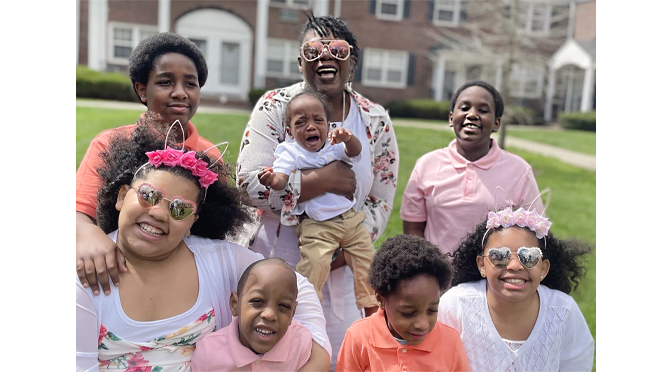Photo caption: Crystal Hunter with her grandchildren.
Crystal Hunter, a bubbly person with an infectious personality, is a leader in her family. In 2021 when her very first colonoscopy discovered that she had colon cancer, she was understandably shocked.
“I was always the strong one in the family,” she said. “I’m a go-getter, the one who gets things done. I’m the one who takes care of people. The hardest part of having the cancer was my self-identity, because suddenly I was the who needed someone to help care for me.”
St. Luke’s is a regional leader in the prevention, diagnosis and treatment of colon cancer with a dedicated, compassionate team of gastroenterologists, surgeons and cancer specialists committed to providing high quality care and advanced treatment options.
Crystal, 49 at the time, chose St. Luke’s gastroenterologist Caitlin Foley, MD, for that colonoscopy.
Crystal had the cancer surgically removed and was treated with chemotherapy. Colonoscopies since then show her to be cancer-free.
“We can cure it,” Dr. Foley said of colorectal cancer. “Sometimes we can cure it with surgery, sometimes we must cure it with surgery and chemotherapy or radiation, but we know if we catch it early, we can cure it. That’s why it is so important to get screened and not ignore any potential symptoms.”
Crystal almost ignored her symptoms. She took iron supplements for a mild case of iron deficiency and experienced constipation that she chalked up to taking the iron supplements and not drinking enough water. But then she experienced rectal bleeding, and reported it to her primary care physician, who recommended the colonoscopy.
After her recovery, Crystal noticed that some other aches and pains she described as stomach issues simply disappeared.
“The biggest thing I would tell people is to take an active part in your healthcare,” she said. “Be candid with your physician. Something you may not think is important may be a sign of a bigger problem. Dr. Foley was wonderful with me, and she pulled out information about me that I barely thought about. She allowed me to be myself. Even after my colonoscopy when the diagnosis came back, she was mindful of and attentive to my response. Her bedside manner is commendable.”
Crystal lives in Bethlehem, but works at a school in East Orange, N.J. She has three children, seven grandchildren, and is raising two of the grandchildren. The entire time she battled through cancer, she pushed herself to take her grandchildren to and from the school bus stop, but says she is now mobile without fatigue and can run up and down the stairs like a two-year-old.
“Colorectal cancer is one of the few cancers that we can prevent from developing into a more serious form,” Dr. Foley said. “It’s the reason we recommend colon cancer screenings. Colon cancer starts as a pre-cancerous polyp called an adenoma, and we can find them when they are very small and remove them during a colonoscopy so that they don’t get a chance to grow into cancer.”
Dr. Foley praised Crystal’s outlook and enthusiasm to not just deal with the cancer, but to reach back and help others.
“It’s amazing how passionate she’s been with giving back from the experience, willing to help other people and raise awareness to get a colonoscopy for a screening to help prevent colon cancer.”
About St. Luke’s
Founded in 1872, St. Luke’s University Health Network (SLUHN) is a fully integrated, regional, non-profit network of more than 20,000 employees providing services at 15 campuses and 300+ outpatient sites. With annual net revenue of $3.4 billion, the Network’s service area includes 11 counties in two states: Lehigh, Northampton, Berks, Bucks, Carbon, Montgomery, Monroe, Schuylkill and Luzerne counties in Pennsylvania and Warren and Hunterdon counties in New Jersey. St. Luke’s hospitals operate the largest network of trauma centers in Pennsylvania, with the Bethlehem Campus being home to St. Luke’s Children’s Hospital.
Dedicated to advancing medical education, St. Luke’s is the preeminent teaching hospital in central-eastern Pennsylvania. In partnership with Temple University, the Network established the Lehigh Valley’s first and only four-year medical school campus. It also operates the nation’s longest continuously operating School of Nursing, established in 1884, and 45 fully accredited graduate medical educational programs with more than 400 residents and fellows. In 2022, St. Luke’s, a member of the Children’s Hospital Association, opened the Lehigh Valley’s first and only free-standing facility dedicated entirely to kids.
SLUHN is the only Lehigh Valley-based health care system to earn Medicare’s five-star ratings (the highest) for quality, efficiency and patient satisfaction. It is both a Leapfrog Group and Healthgrades Top Hospital and a Newsweek World’s Best Hospital. The Network’s flagship University Hospital has earned the 100 Top Major Teaching Hospital designation from Fortune/PINC AI 11 times total and eight years in a row, including in 2023 when it was identified as THE #4 TEACHING HOSPITAL IN THE COUNTRY. In 2021, St. Luke’s was identified as one of the 15 Top Health Systems nationally. Utilizing the Epic electronic medical record (EMR) system for both inpatient and outpatient services, the Network is a multi-year recipient of the Most Wired award recognizing the breadth of the SLUHN’s information technology applications such as telehealth, online scheduling and online pricing information. The Network is also recognized as one of the state’s lowest cost providers.
Information provided to TVL by:
Sam Kennedy


